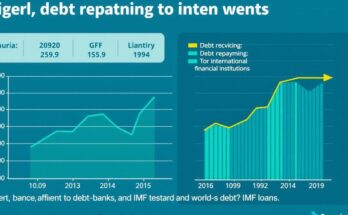Political unrest in Mozambique is adversely affecting Eswatini’s sugar exports, forcing the industry to consider alternate transport routes due to severe border congestion and closure. The Maputo port, crucial for exports, has become unreliable, leading to increased costs and delays. Political analysts warn about the long-term economic impact of this unrest on neighboring countries like Eswatini, urging the need for enhanced conflict management strategies.
Recent political unrest and protests in Mozambique have significantly disrupted Eswatini’s sugar export operations, forcing the industry to seek alternative transportation routes. The sugar sector in Eswatini relies heavily on the Maputo port terminal, a crucial facility for exporting raw sugar to the European Union and the United States, which has been instrumental since the mid-1990s. However, the instability in Mozambique has compelled Eswatini to consider using the Durban port in South Africa, which poses additional logistical challenges and costs.
Nontobeko Mabuza of the Eswatini Sugar Association articulated the seriousness of this disruption, stating that the unrest could endanger exports to both regional and European markets. Furthermore, Bhekizwe Maziya, head of the national agriculture marketing board, voiced concerns over significant delays caused by border congestion exacerbated by the closure of the Lebombo border crossing. These challenges are compounded by the violent protests led by opposition figure Venancio Mondlane, which have resulted in widespread transportation disruptions and tragic loss of life.
Political analysts have begun to warn of long-term consequences for southern African economies, particularly for landlocked nations such as Eswatini that depend heavily on Mozambique for export routes. They emphasize the critical need for neighboring countries to reassess their reliance on Mozambique amid ongoing unrest, urging the Southern African Development Community to enhance regional conflict management and accountability.
The political unrest occurring in Mozambique is primarily driven by contestations over election results, leading to severe protests and clashes with security forces. This unrest has critically affected the traffic and transportation networks, with significant implications for regional trade in southern Africa, particularly for countries such as Eswatini that depend on Mozambique’s ports for exporting essential commodities. This scenario underscores the vulnerability of landlocked nations to political instability in neighboring states and highlights the importance of developing alternative trade routes to mitigate economic disruptions.
The political unrest in Mozambique has created serious challenges for Eswatini’s sugar export industry, with significant financial implications and logistical complexities resulting from the need to reroute shipments. As the situation continues to unfold, stakeholders in the region are urged to explore alternative transport options while also recognizing the importance of conflict management initiatives within the Southern African Development Community to prevent future disruptions. Ultimately, increased regional cooperation and strategic planning will be vital in maintaining stability and sustainability for trade-dependent nations in the area.
Original Source: www.voanews.com




